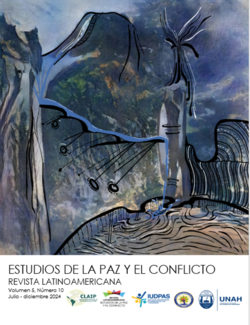Dónde negociar la paz: la internacionalización de la paz colombiana, 1980-2023
DOI:
https://doi.org/10.5377/rlpc.v5i10.17876Palabras clave:
Colombia, proceso de paz, fase de negociación, acuerdos de paz, temas procedimentales de la pazResumen
Objetivo: Este artículo analiza el componente espacial de las negociaciones de paz de Colombia, desde 1980 hasta 2023. Metodología: A partir de una revisión de la literatura se explora el tema locativo de las negociaciones de paz, tanto desde la teoría como la realidad. Resultados: se muestra que un componente explicativo del éxito o fracaso de las negociaciones de paz en el país depende de los espacios donde estas se han realizado, debido a los factores de neutralidad, diálogo, simbolismo, seguridad y accesibilidad. Conclusiones: El caso colombiano ilustra la importancia de la internacionalización de las negociaciones de paz. Evidencia cómo la elección del territorio ofrece ventajas reales y simbólicas a su favor las negociaciones, y por ende, determina el fin de la guerra.
Descargas
341
HTML 33
XML 21
EPUB 63
Publicado
Cómo citar
Número
Sección
Licencia
Derechos de autor 2024 Revista Latinoamericana Estudios de la Paz y el Conflicto

Esta obra está bajo una licencia internacional Creative Commons Atribución 4.0.
Los contenidos de la revista se publican bajo licencia Creative Commons Reconocimiento 4.0 (CC BY 4.0). Esta licencia permite a terceros compartir (copiar y redistribuir el material en cualquier medio o formato) y adaptar (remezclar, transformar y crear a partir del material para cualquier finalidad, incluso comercial), siempre que se reconozca la autoría y la primera publicación en esta revista (Revista Latinoamericana Estudios de la Paz y el Conflicto, Universidad Nacional Autónoma de Honduras - Consejo Latinoamericano de Investigación para la Paz, DOI de la obra), se proporcione un enlace a la licencia y se indique si se han realizado cambios en ésta. Los términos de la licencia están disponibles online en http://creativecommons.org.




